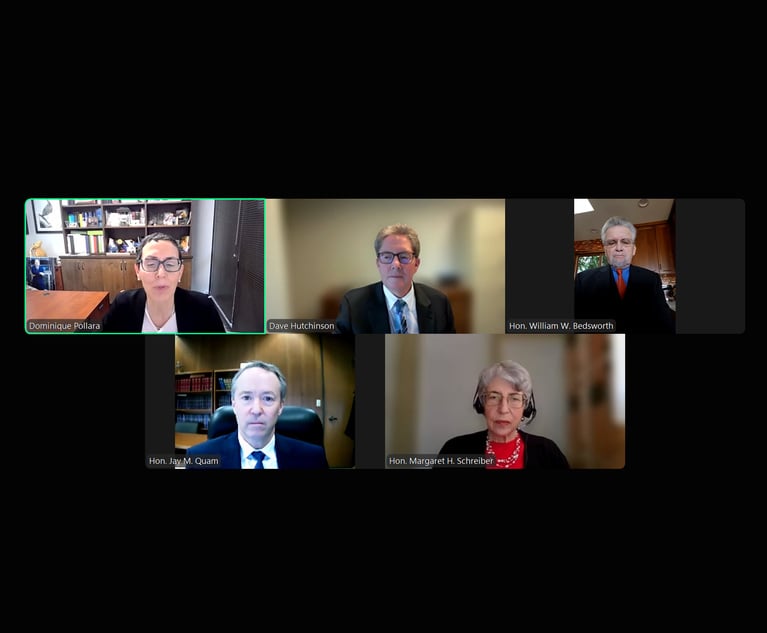How to Prevent Data Theft From Lost Devices
Four simple steps can help safeguard client data when cellphones and computers go missing.
November 10, 2015 at 11:22 AM
7 minute read
Technology can be a blessing and a curse for attorneys. While technology enables attorneys to be able to conduct business on the go, it also puts client and firm data at risk. In the United States, someone loses a cellphone every 3.5 seconds. More than 3 million cellphones are stolen every year. More than 12,000 laptops are lost in airports each week. Other portable electronic devices, ranging from BlackBerrys to iPads to many others are lost just as frequently. Almost every attorney's portable electronic device includes some confidential client information
Most attorneys today conduct business in roaming offices, traveling with huge amounts of client information with them via portable electronic devices. When those devices are lost or stolen, it is tantamount to leaving the doors of the law office unlocked or welcoming a thief to break in. The attorney's and clients' information is readily available for the taking.
California attorneys also have duties to clients that are impacted by technology. Per California State Bar Formal Opinion No. 2010-179, attorneys are supposed to consider several factors when accessing or transmitting confidential client data over a wireless or personal network that is not subject to high levels of security: (1) the level of security attendant to the use of that technology, including whether reasonable precautions may be taken when using the technology to increase the level of security; (2) the legal ramifications to a third party who intercepts, accesses or exceeds authorized use of the electronic information; (3) the degree of sensitivity of the information; (4) the possible impact on the client of an inadvertent disclosure of privileged or confidential information or work product; (5) the urgency of the situation; and (6) the client's instructions and circumstances, such as access by others to the client's devices and communications.
This content has been archived. It is available through our partners, LexisNexis® and Bloomberg Law.
To view this content, please continue to their sites.
Not a Lexis Subscriber?
Subscribe Now
Not a Bloomberg Law Subscriber?
Subscribe Now
NOT FOR REPRINT
© 2025 ALM Global, LLC, All Rights Reserved. Request academic re-use from www.copyright.com. All other uses, submit a request to [email protected]. For more information visit Asset & Logo Licensing.
You Might Like
View All
US Courts Announce Closures in Observance of Jimmy Carter National Mourning Day
2 minute read
'Appropriate Relief'?: Google Offers Remedy Concessions in DOJ Antitrust Fight
4 minute read
'Serious Disruptions'?: Federal Courts Brace for Government Shutdown Threat
3 minute read
‘It's Your Funeral’: On Avoiding Damaging Your Client’s Case With Uncivil Behavior
Trending Stories
Who Got The Work
Michael G. Bongiorno, Andrew Scott Dulberg and Elizabeth E. Driscoll from Wilmer Cutler Pickering Hale and Dorr have stepped in to represent Symbotic Inc., an A.I.-enabled technology platform that focuses on increasing supply chain efficiency, and other defendants in a pending shareholder derivative lawsuit. The case, filed Oct. 2 in Massachusetts District Court by the Brown Law Firm on behalf of Stephen Austen, accuses certain officers and directors of misleading investors in regard to Symbotic's potential for margin growth by failing to disclose that the company was not equipped to timely deploy its systems or manage expenses through project delays. The case, assigned to U.S. District Judge Nathaniel M. Gorton, is 1:24-cv-12522, Austen v. Cohen et al.
Who Got The Work
Edmund Polubinski and Marie Killmond of Davis Polk & Wardwell have entered appearances for data platform software development company MongoDB and other defendants in a pending shareholder derivative lawsuit. The action, filed Oct. 7 in New York Southern District Court by the Brown Law Firm, accuses the company's directors and/or officers of falsely expressing confidence in the company’s restructuring of its sales incentive plan and downplaying the severity of decreases in its upfront commitments. The case is 1:24-cv-07594, Roy v. Ittycheria et al.
Who Got The Work
Amy O. Bruchs and Kurt F. Ellison of Michael Best & Friedrich have entered appearances for Epic Systems Corp. in a pending employment discrimination lawsuit. The suit was filed Sept. 7 in Wisconsin Western District Court by Levine Eisberner LLC and Siri & Glimstad on behalf of a project manager who claims that he was wrongfully terminated after applying for a religious exemption to the defendant's COVID-19 vaccine mandate. The case, assigned to U.S. Magistrate Judge Anita Marie Boor, is 3:24-cv-00630, Secker, Nathan v. Epic Systems Corporation.
Who Got The Work
David X. Sullivan, Thomas J. Finn and Gregory A. Hall from McCarter & English have entered appearances for Sunrun Installation Services in a pending civil rights lawsuit. The complaint was filed Sept. 4 in Connecticut District Court by attorney Robert M. Berke on behalf of former employee George Edward Steins, who was arrested and charged with employing an unregistered home improvement salesperson. The complaint alleges that had Sunrun informed the Connecticut Department of Consumer Protection that the plaintiff's employment had ended in 2017 and that he no longer held Sunrun's home improvement contractor license, he would not have been hit with charges, which were dismissed in May 2024. The case, assigned to U.S. District Judge Jeffrey A. Meyer, is 3:24-cv-01423, Steins v. Sunrun, Inc. et al.
Who Got The Work
Greenberg Traurig shareholder Joshua L. Raskin has entered an appearance for boohoo.com UK Ltd. in a pending patent infringement lawsuit. The suit, filed Sept. 3 in Texas Eastern District Court by Rozier Hardt McDonough on behalf of Alto Dynamics, asserts five patents related to an online shopping platform. The case, assigned to U.S. District Judge Rodney Gilstrap, is 2:24-cv-00719, Alto Dynamics, LLC v. boohoo.com UK Limited.
Featured Firms
Law Offices of Gary Martin Hays & Associates, P.C.
(470) 294-1674
Law Offices of Mark E. Salomone
(857) 444-6468
Smith & Hassler
(713) 739-1250






